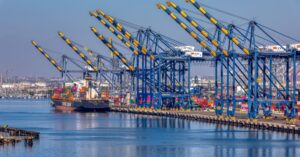In logistics and supply chain, the role of freight brokers goes well beyond connecting shippers with carriers. They oversee scheduling, tracking, and timely delivery, find competitive rates, and can act as a centralized logistics hub on behalf of clients.
There are two main flavors of freight broker: asset-based and non-asset-based. Asset-based freight brokers of course own and operate their fleets of trucks and trailers. A non-asset-based provider has access to a large network of carriers across modes and service types, giving shippers a range of transportation options.
Beyond these basic differences, what other distinctives separate the two categories of freight brokerage? More importantly, what are the pros and cons when considering which makes the most sense for you? Let’s explore this topic in more detail.
Breaking Down Asset-Based Freight Brokers
Since asset-based freight brokers use their own fleets of trucks and trailers, as well as warehouses and other physical assets, they can provide greater control over logistics services.
As they can prioritize shipments within their networks, they provide a high degree of reliability. And with direct operational control, they focus on strong service levels by enforcing strict quality standards for vehicles and drivers.
Shipping rates may be more stable and predictable with an asset-based broker, and they often use specialized equipment based on shippers’ unique needs. For instance, some provide refrigerated logistics or oversized, heavy-haul transport for manufacturing, energy, or construction. Others are cross-border specialists, using their own fleet for domestic hauling and leaning on partners for routes into Mexico or Canada.
On the downside, asset-based freight brokers may not be as flexible in terms of national coverage based on location and footprint. Expanding beyond it brings in third-party carriers, reducing control. By nature, they tend to operate in a way that prioritizes fleet utilization over cost for shippers to protect their investments and profits.
A Closer Look at Non-Asset-Based Freight Brokers
Non-asset-based freight brokers leverage an extensive network of carriers and logistics providers. As intermediaries, they offer flexibility and a range of solutions addressing diverse freight needs.
The business model of non-asset-based freight brokers depends on maintaining strong carrier relationships, which allows them to be highly selective on behalf of shippers. They can procure loads based purely on cost, performance, or availability, or a mix of factors, without worrying about fleet utilization like owned-asset operators.
Speaking of cost, they’re often more price competitive than asset-based brokers due to a wider network of carriers, lanes, modes, and service types.
Scalability is another plus with non-asset-based brokers, as they’re not limited by coverage area or fleet location. Large networks often number in the tens of thousands, making it easier to adjust to demand, expand into new markets, and offer diverse modes and services without capital constraints.
On the downside, non-asset-based freight brokers don’t have direct control over the operations of carriers, and there’s the potential for service quality variability. However, they are able to closely monitor carrier performance and set strict service requirements.
Choosing the Right Broker for Your Needs
Based on your unique situation, there are times when one type of broker model makes more sense than the other. Here are some examples.
When to Lean Toward an Asset-Based Broker
If you have consistent high-volume shipments on fixed routes, an asset-based provider could be the more cost-effective way to go. These types of loads can be easily plugged into a fleet model, providing greater service reliability.
Companies with the need for specialized handling or oversized loads, or a greater reliance on speed, may want to take a closer look at the asset-based model. That said, non-asset-based brokers have been beefing up their specialized offerings, service levels, and expedited capabilities.
A desire for stable, long-term pricing is another factor in favor of an asset-based choice. Just by virtue of having an owned and managed fleet, shippers can lock in pricing and manage costs through long-term contracts.
When to Choose a Non-Asset-Based Broker
If your business has irregular shipment patterns or volume peaks, seasonal or otherwise, a non-asset-based freight broker offers advantages. Because of their greater flexibility and large carrier networks, they can scale easier and faster without the constraints of fleet size or location.
If you have changing shipping requirements, a non-asset-based broker can easily source a variety of equipment types and modes, without being tied to fixed routes or schedules. This allows them to accommodate last-minute changes, irregular lanes, or sudden demand spikes.
With cost always in the mix, they can negotiate competitive rates through volume pricing and help provide access to capacity when the market is tight. Lastly, if tracking and visibility are a top priority, non-asset-based providers often use advanced tools to manage disruptions, reroute shipments, and find alternative carriers quickly.
Other Factors for Evaluating Brokers
The vetting process of course needs to go well beyond asset status. Look for a partner that offers a mix of technology, service excellence, reliability, a solid carrier network, and full transparency.
Technology: Important factors include the ability to provide real-time tracking, dynamic pricing, and data analytics to continuously improve scheduling, routing, and load efficiency.
Service: What is the provider’s on-time percentage? What is the record on safety and exceptions? How responsive are they when issues arise? Are they able to problem-solve and reroute or find alternatives?
Network: Do they have established relationships with reliable carriers that can handle your freight profile? How well do they balance spot and contract rates by managing market conditions, shipper priorities, and capacity?
Transparency: Do they clearly communicate about their rates, fees and surcharges, and every aspect of the booking and scheduling process?
Asset-Based Or Not, Find a Reliable Broker That Fits
Freight brokers provide a valuable service for shippers that don’t have the in-house experience, resources, or bandwidth to handle every aspect of transportation management. Deciding between an asset-based or non-asset-based provider depends on your freight profile, need for flexibility, and budget. Either way, what’s most important is choosing a reliable broker that can consistently deliver on your service expectations.
COGISTICS Transportation, a non-asset-based provider of 3PL solutions with a 30-plus year legacy in logistics, consistently delivers fast, efficient service across land, air, and ocean freight operations. Specialists in expedited freight when speed matters, COGISTICS Transportation’s broad carrier network, deep industry relationships, and market expertise give you peace of mind on every valuable shipment. To learn more about how you can benefit from our melding of technology with a high-touch, personalized approach, get in touch with us today.




